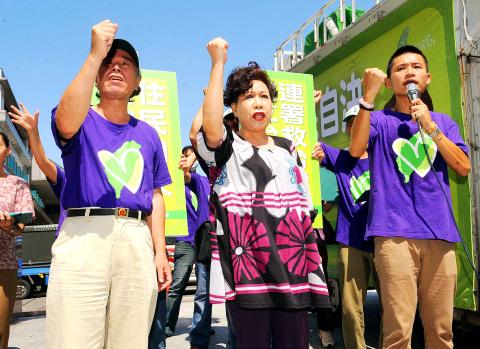Ellen Huang (黃越綏), a strong proponent of Taiwanese independence who advocated self-determination and founding a nation through a referendum as part of her presidential bid, announced yesterday that she was dropping out of the race.
Huang’s decision was seen as an expression of goodwill toward Democratic Progressive Party (DPP) Chairperson Tsai Ing-wen’s (蔡英文) presidential bid.
However, the Taiwanese National Party, another pro-independence group, announced in the afternoon that its founder, Chang Mung-hsieh (莊孟學), would enter the race.

Photo: Chang Chia-ming, Taipei Times
Huang’s unexpected decision and Chuang’s entry into the race have drawn attention, but it is said that Chang and Tsai would work toward the same goal although their approach might be different.
Taiwanese National Party founding chairman Huang Hua (黃華) said the party’s decision to nominate Chang would not affect Tsai’s chances in the election, because they would only advocate the foundation of an independent Taiwan as a nation in the election process.
“We will say what is inappropriate for Tsai to say,” Huang Hua said, adding that they would support Tsai for president.
Ellen Huang’s campaign office spokesperson, Chang Ming-yu (張銘祐), said her decision was indicative of consolidation within the pro-independence groups and an expression of goodwill to Tsai.
“The process of collecting signatures to join the election was for the purpose of emphasizing self-determination and founding a nation through referendum,” Chang said.
Accompanied by several senior independence proponents, Peng Ming-min (彭明敏) and Su Beng (史明), Ellen Huang held a press conference where the more than 100,000 signatures collected for her sake were unveiled.
She reaffirmed the concept of self-determination and the founding of a nation through referendum.
Huang Hua said Chuang was a former education section chief at the Lee Teng-Hui Academy, adding that it was the party’s view that a candidate who supports the founding of an independent nation must join the election.

SHIPS, TRAINS AND AUTOMOBILES: The ministry has announced changes to varied transportation industries taking effect soon, with a number of effects for passengers Beginning next month, the post office is canceling signature upon delivery and written inquiry services for international registered small packets in accordance with the new policy of the Universal Postal Union, the Ministry of Transportation and Communications said yesterday. The new policy does not apply to packets that are to be delivered to China, the ministry said. Senders of international registered small packets would receive a NT$10 rebate on postage if the packets are sent from Jan. 1 to March 31, it added. The ministry said that three other policies are also scheduled to take effect next month. International cruise ship operators

HORROR STORIES: One victim recounted not realizing they had been stabbed and seeing people bleeding, while another recalled breaking down in tears after fleeing A man on Friday died after he tried to fight the knife-wielding suspect who went on a stabbing spree near two of Taipei’s busiest metro stations, Taipei Mayor Chiang Wan-an (蔣萬安) said. The 57-year-old man, identified by his family name, Yu (余), encountered the suspect at Exit M7 of Taipei Main Station and immediately tried to stop him, but was fatally wounded and later died, Chiang said, calling the incident “heartbreaking.” Yu’s family would receive at least NT$5 million (US$158,584) in compensation through the Taipei Rapid Transit Corp’s (TRTC) insurance coverage, he said after convening an emergency security response meeting yesterday morning. National

The Forestry and Nature Conservation Agency yesterday launched a gift box to market honey “certified by a Formosan black bear” in appreciation of a beekeeper’s amicable interaction with a honey-thieving bear. Beekeeper Chih Ming-chen (池明鎮) in January inspected his bee farm in Hualien County’s Jhuosi Township (卓溪) and found that more than 20 beehives had been destroyed and many hives were eaten, with bear droppings and paw prints near the destroyed hives, the agency said. Chih returned to the farm to move the remaining beehives away that evening when he encountered a Formosan black bear only 20m away, the agency said. The bear

PLANNED: The suspect visited the crime scene before the killings, seeking information on how to access the roof, and had extensively researched a 2014 stabbing incident The suspect in a stabbing attack that killed three people and injured 11 in Taipei on Friday had planned the assault and set fires at other locations earlier in the day, law enforcement officials said yesterday. National Police Agency (NPA) Director-General Chang Jung-hsin (張榮興) said the suspect, a 27-year-old man named Chang Wen (張文), began the attacks at 3:40pm, first setting off smoke bombs on a road, damaging cars and motorbikes. Earlier, Chang Wen set fire to a rental room where he was staying on Gongyuan Road in Zhongzheng District (中正), Chang Jung-hsin said. The suspect later threw smoke grenades near two exits